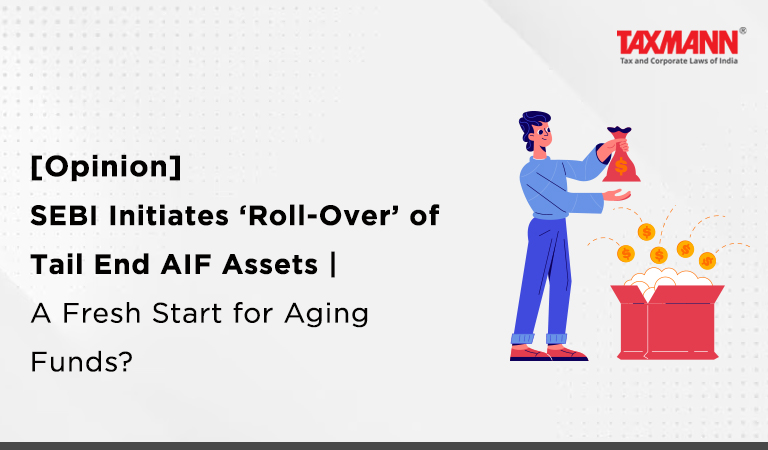[Opinion] SEBI Initiates ‘Roll-Over’ of Tail End AIF Assets | A Fresh Start for Aging Funds?
- Blog|News|Company Law|
- 3 Min Read
- By Taxmann
- |
- Last Updated on 6 June, 2023

1. Introduction
In early 2023, the Securities and Exchange Board of India (“SEBI“), vide its consultation paper dated February 3, 2023 (“Consultation Paper“), sought comments on proposals to provide flexibility to tail-end alternative investment funds (“AIFs“) late into their extended phase along with their investors to carry forward unliquidated investments or its schemes upon expiry of its/their tenure as prescribed under the SEBI (Alternative Investment Funds) Regulations, 2012 (“AIF Regulations“).
Thereafter, as per the press release of the SEBI board meeting dated March 29, 2023, SEBI has, inter alia, in essence, granted its in-principal approval to the proposal(s) listed in its Consultation paper.
SEBI’s rationale in establishing regulatory mechanisms aimed at facilitating closures of tail-end AIFs is in light of the representations received from AIFs regarding the extension of the tenure of their schemes citing reasons such as lack of liquidity, legal, regulatory impediments, etc.
Therefore, as per SEBI, the way forward would entail complete closure of the scheme, recognition of the true asset value, and re-opening of a fresh fund at that value, which would satisfy the twin objectives of providing additional flexibility to investors/funds while ensuring disclosure and tracking of true asset value and fund performance, which, as per SEBI is a regulatory objective.
Though SEBI, through this Consultation Paper, has set out its intent in addressing the plethora of challenges surrounding the recognition of unrealized capital upon fund maturity, further clarity may be gathered from the circulars or amendments which shall follow for this purpose.
2. Current Position under the Existing AIF Regulations
Presently, an AIF and the investment manager of the AIF upon expiry of the tenure of a scheme of the AIF under the AIF Regulations, AIFs (except Large Value Funds for Accredited Investors (“LVF“)) may extend the tenure of a scheme only up to two years, subject to receiving the approval of two-thirds of the investors by value of their investment in the AIF. LVFs, on the other hand, are permitted to extend their tenure beyond two years, subject to the terms of their fund documents and such conditions as may be specified by SEBI from time to time.
Winding up of an AIF has its own procedural norms to be followed depending on how the AIF was set up – that is, trust, company or LLP.
AIFs also have the option to distribute the assets of the AIF in-specie, after obtaining the approval of at least seventy-five per cent of the investors by value of their investment in the AIF. In case in-specie distribution of assets does materialize, AIFs are required to fully liquidate the scheme within one year following expiration of the AIF’s tenure.
In this context, it is worth noting that the AIF Regulations do not explicitly prohibit an AIF from acquiring the residual assets of another AIF, including, where the investment manager and/or sponsor of such transacting AIFs are the same. It may very well be the case that the investment manager and/or sponsor of an AIF whose life cycle is drawing to a close will launch a new AIF and carry forward the residual investments of the existing AIF to the new AIF subject to suitable disclosures in the new AIF’s private placement memorandum.
Click Here To Read The Full Article
Disclaimer: The content/information published on the website is only for general information of the user and shall not be construed as legal advice. While the Taxmann has exercised reasonable efforts to ensure the veracity of information/content published, Taxmann shall be under no liability in any manner whatsoever for incorrect information, if any.

Taxmann Publications has a dedicated in-house Research & Editorial Team. This team consists of a team of Chartered Accountants, Company Secretaries, and Lawyers. This team works under the guidance and supervision of editor-in-chief Mr Rakesh Bhargava.
The Research and Editorial Team is responsible for developing reliable and accurate content for the readers. The team follows the six-sigma approach to achieve the benchmark of zero error in its publications and research platforms. The team ensures that the following publication guidelines are thoroughly followed while developing the content:
- The statutory material is obtained only from the authorized and reliable sources
- All the latest developments in the judicial and legislative fields are covered
- Prepare the analytical write-ups on current, controversial, and important issues to help the readers to understand the concept and its implications
- Every content published by Taxmann is complete, accurate and lucid
- All evidence-based statements are supported with proper reference to Section, Circular No., Notification No. or citations
- The golden rules of grammar, style and consistency are thoroughly followed
- Font and size that’s easy to read and remain consistent across all imprint and digital publications are applied



 CA | CS | CMA
CA | CS | CMA
